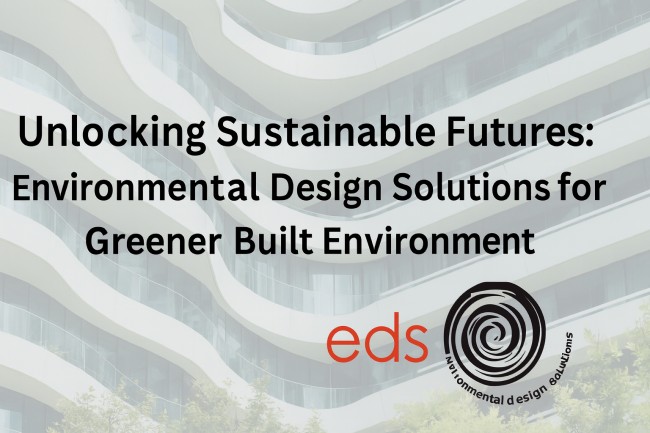Unlocking Sustainable Futures: Environmental Design Solutions for a Greener Built Environment

Environmental design solutions have become a cornerstone in today’s drive towards sustainability, especially in the construction and built environment sectors. With rising concerns over climate change, energy consumption, and environmental degradation, companies like Environmental Design Solutions (EDS) are pioneering sustainable strategies that reshape how buildings are designed, constructed, and operated. This article delves into what environmental design solutions entail, highlights the expertise of EDS, and explains why such solutions are critical for a sustainable future.
What Are Environmental Design Solutions?
Environmental design solutions refer to a broad spectrum of strategies and practices aimed at minimising the ecological impact of buildings and infrastructure while enhancing energy efficiency, occupant comfort, and resource conservation. These solutions integrate sustainability principles in architecture, engineering, urban planning, and policy development, ensuring that new and existing structures align with green building standards and environmental regulations.
By implementing high-performance design consulting, renewable energy integration, policy advisory, education, and advanced software tools, environmental design solutions help reduce greenhouse gas emissions, optimise energy use, and foster healthier living and working spaces.
Introducing Environmental Design Solutions (EDS)
A Pioneer in Sustainable Built Environment Consulting
Environmental Design Solutions (EDS) is a renowned sustainability advisory firm headquartered in New Delhi, India. Founded in 2003, EDS has earned its reputation by successfully delivering over 800 green building and energy efficiency projects worldwide. The company’s work spans a vast array of disciplines including climate change mitigation policies, energy-efficient building design, building code development, energy simulation, and green building certification.
EDS’s commitment to sustainability transcends consultancy; it actively participates in policy development and standard-setting at both national and international levels. One of their most significant contributions is the development of the Energy Conservation Building Code (ECBC) in India, which establishes minimum energy efficiency standards for buildings.
Website, Contact, and Headquarters
-
Website: https://www.edsglobal.com
-
Headquarters: D-1/25, Vasant Vihar, New Delhi, 110057, India
-
Phone: (Specific phone number not publicly listed, but available via their website contact form)
-
Founded: 2003
-
Company Size: 11-50 employees
-
Industry: Construction and Sustainability Consulting
Core Specialties of Environmental Design Solutions
EDS specialises in several key areas that underpin their comprehensive approach to sustainability:
Green Buildings and Sustainable Design
EDS assists clients in designing buildings that meet rigorous green standards, ensuring minimal environmental footprint through resource efficiency and innovative technologies.
Energy Efficient Building Design
They employ cutting-edge energy simulation and analysis tools to optimise building performance, lowering operational costs and energy consumption.
Green Building Rating System Facilitation
EDS supports certification processes for systems like LEED, IGBC, and GRIHA, guiding projects through sustainability assessments and compliance.
Energy Simulation and Software Tools
Advanced energy modelling software helps predict and improve building performance, enabling data-driven design decisions.
Training Programs and Capacity Building
EDS runs educational programs to build expertise in sustainable design, certification processes, and emerging climate policies among industry professionals.
Climate Change Policy and Code Development
The firm actively contributes to the formulation and implementation of building energy codes and climate policies at both the national and international levels.
Research and Development
Continual innovation is a hallmark of EDS’s work, with research initiatives focusing on new sustainability technologies and best practices.
The Importance of Environmental Design Solutions in Today’s World
Addressing Climate Change
Buildings contribute nearly 40% of global energy-related carbon emissions. Environmental design solutions help reduce this impact by integrating energy-saving measures, renewable energy sources, and sustainable materials.
Enhancing Energy Efficiency
Optimised building designs minimise energy waste, reducing dependence on fossil fuels and lowering utility costs for occupants and owners.
Supporting Policy and Standards
By developing and supporting energy codes and sustainability standards, firms like EDS help create frameworks that drive widespread adoption of green building practices.
Improving Health and Comfort
Sustainable designs also prioritise indoor environmental quality—improving air quality, natural lighting, and thermal comfort—leading to healthier occupants.
Economic Benefits
Sustainability-focused buildings often enjoy lower operating costs, increased asset value, and eligibility for incentives, making environmental design solutions a financially smart choice.
EDS’s Approach to Sustainable Solutions for the Built Environment
Macro-Level Policy Advisory and Planning
EDS works with governments, institutions, and international bodies to develop climate change policies, building codes, and energy efficiency regulations that set the direction for sustainable urban development.
Micro-Level Product Standards and Labelling
On a detailed level, EDS develops standards and certification for energy-efficient products and appliances, enabling consumers and builders to make environmentally responsible choices.
Integration of Energy-Efficiency Parameters
At the building scale, EDS implements solutions that ensure design, construction, and operation phases incorporate energy efficiency, resource conservation, and sustainable materials.
Outreach, Communication, Documentation, and Training
Capacity Building
Recognising the need for widespread knowledge, EDS offers extensive training programs to enhance the skillsets of architects, engineers, builders, and policymakers.
Research and Development
Through research, EDS stays at the forefront of innovations, providing clients with up-to-date strategies that meet evolving environmental challenges.
Documentation and Communication
EDS ensures all projects and policies are supported with detailed documentation and effective communication strategies to facilitate adoption and compliance.
Why Choose Environmental Design Solutions?
Choosing a partner like EDS means aligning with a leader deeply embedded in sustainability across all levels of the built environment. Their comprehensive expertise, global experience, and commitment to innovation make them ideal for clients seeking impactful, lasting environmental solutions.
Their proven track record, including work on over 800 projects and key contributions like the Indian ECBC, reflects their ability to deliver measurable results.
Conclusion
Environmental design solutions are not just a trend but a necessity for a sustainable future. As global challenges like climate change intensify, the built environment must evolve through innovation, policy, and education. Environmental Design Solutions (EDS) stands out as a pivotal player in this transformation—offering high-performance design consulting, renewable energy integration, policy advisory, education, and software tools.



